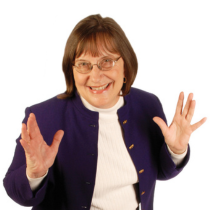Caring for a loved one with Alzheimer’s can be an overwhelming experience, impacting not only the person diagnosed but everyone around them. Both family and professional caregivers face the emotional toll of watching a familiar personality change and the practical strain of providing around-the-clock care. Balancing the role of caregiver with other personal responsibilities, managing stress, and addressing burnout are common challenges in this journey.
To shed more light on these realities, Jo Huey, a leading advocate in Alzheimer’s care and creator of the “Ten Absolutes” communication guide, shares her insights. Drawing from years of experience, Jo offers practical strategies and support methods to help caregivers find balance and resilience.
Loss of the person in the role they have held in their life. Understanding the challenges presented daily. Fatigue! Accepting assistance, even admitting assistance, is needed. Guilt, anger, sadness, hopelessness—to name a few.
First, I ask a few simple questions, e.g., how much sleep are you getting, when was the last time you did something by and/or for yourself, what are your favorite things to do, and is there anyone you can depend on for assistance? These answers, often accompanied by tears, assist with determining strategies. Make them aware of local support groups. Provide information regarding daycare and or home care services.
– Jo Huey
Of course, I provide a copy of my Ten Absolutes, especially the one with examples. If warranted, I give them my books. I always ask them to list their favorite things to do, especially the small ones, e.g., a morning cup of coffee/tea undisturbed, reading the paper, reading a book, answering emails, and Facebook. Going to the bathroom, showering, taking personal care, or making a phone call undisturbed. Then, we will plan when and how to add at least one of these back into their daily routine. Reemphasize the value of support groups.
I think I covered this in items 2 and 3 to some extent. I always ask the question: What would happen to your loved one if something happened to you (the primary caregiver)? Encourage a family meeting with significant family members; they can all be together, with the advantage of conference calls or Zoom. Facilitate this call by asking how the illness of (person with illness) makes you feel. Listen carefully to each person’s answer and try to get everyone to allow each person to speak. If warranted and it seems possible, ask for one item each person thinks they can do to contribute to managing/supporting the illness.
Jo’s insights remind caregivers that seeking help, building supportive networks, and engaging in self-care are crucial to thriving through this journey. Her resources offer caregivers a foundation for resilience, making a challenging experience more manageable and meaningful. By prioritizing both connections with the person they care for and compassion toward themselves, caregivers can navigate the complex challenges of Alzheimer’s with renewed strength and purpose.

Jo Huey has been focused on individuals with Alzheimer’s and related disorders even before it became a widely recognized term. Inspired by a personal experience at a young age, Jo is best known for her Communication Tool, the "Ten Absolutes." She has authored several books and training materials, all aimed at helping caregivers—family, friends, and professionals—find joy and connection in their time spent with those experiencing dementia symptoms.